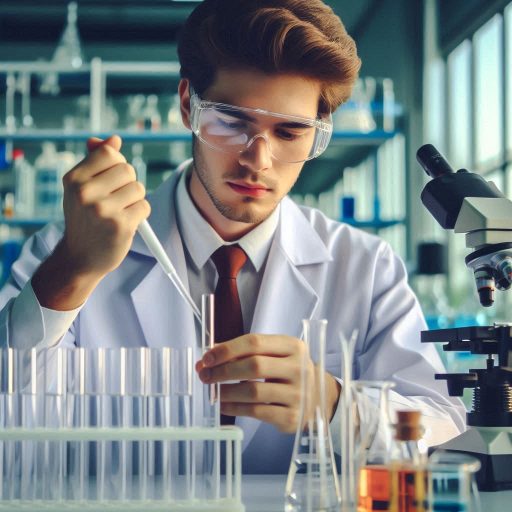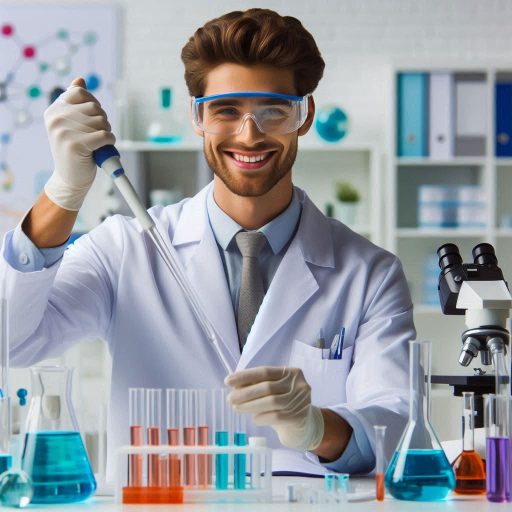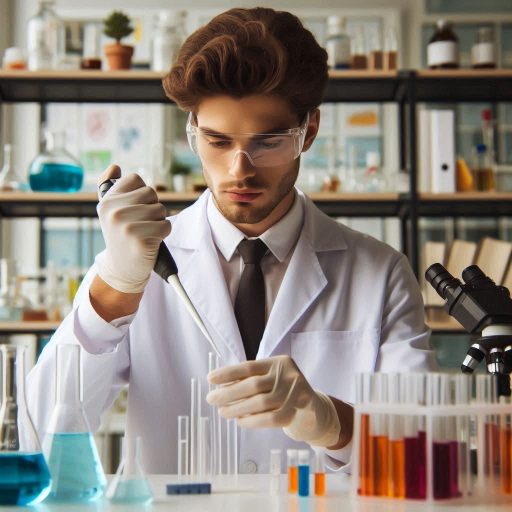Introduction
The Role of Laboratory Technicians and the Importance of Their Work in Healthcare and Research Settings
Laboratory technicians are integral to healthcare and research environments.
They perform vital tasks such as analyzing medical samples, conducting tests, and ensuring precision in results.
Their work is essential for accurate patient diagnoses, effective treatment plans, and advancing medical research.
By managing complex procedures and maintaining rigorous quality standards, laboratory technicians directly impact patient outcomes and scientific progress.
The Competitive Nature of the Job Market for Laboratory Technicians and the Need for Strong Interview Skills
The job market for laboratory technicians is increasingly competitive.
As healthcare and research fields evolve, the demand for skilled technicians grows, making it essential to stand out in interviews.
Candidates must demonstrate not only technical expertise but also strong problem-solving and communication skills.
Effective interview performance is crucial for showcasing one’s ability to contribute to the field and secure a desirable position.
Thorough preparation and strong interview skills are key to navigating this competitive landscape and achieving career success.
Research the Company and Role
The Importance of Researching the Company and Understanding the Specific Requirements of the Laboratory Technician Position
Researching the company and role is crucial for acing your interview.
Understanding the company’s background, mission, and values helps you tailor your responses to align with their expectations.
Knowing the specific requirements of the laboratory technician position ensures you can highlight relevant skills and experiences.
This preparation shows your commitment and enthusiasm for the role.
Tips on How to Gather Information About the Company‘s Culture, Values, and Ongoing Projects
- Review the Company‘s Website: Start by exploring the company‘s official website.
Check the “About Us” section to understand their mission and values.
Review any information about recent projects or developments. - Read Recent News and Press Releases: Look for news articles, press releases, or industry updates related to the company.
This information provides insights into their latest projects and achievements. - Check Employee Reviews: Visit platforms like Glassdoor or Indeed to read employee reviews.
These reviews can offer valuable perspectives on the company‘s culture and work environment. - Explore Social Media: Follow the company on social media platforms like LinkedIn, Twitter, and Facebook.
Companies often share updates about their culture, values, and projects through these channels. - Network with Current or Former Employees: Use LinkedIn or professional networks to connect with current or former employees.
Ask about their experiences and gather insights into the company‘s work environment and expectations. - Analyze the Job Description: Carefully read the job description for the laboratory technician position.
Identify key responsibilities and required skills.
This will help you understand what the company is looking for and how your experience aligns with their needs. - Prepare Thoughtful Questions: During the interview, ask specific questions about the company‘s goals, team dynamics, and ongoing projects.
This demonstrates your interest and shows that you have done your homework.
By following these tips, you can gather comprehensive information about the company and the role.
This preparation will help you present yourself as a well-informed and enthusiastic candidate, increasing your chances of success in the interview.
Review Common Interview Questions
Common Interview Questions That Laboratory Technicians May Encounter During Job Interviews
Laboratory technician interviews often include questions aimed at evaluating your technical skills and problem-solving abilities.
Common questions include: “Can you describe your experience with laboratory equipment?” Employers seek details about your familiarity with tools like centrifuges and spectrometers.
Be prepared to discuss specific equipment you‘ve used and maintenance tasks you‘ve performed.
Another frequent question is, “How do you ensure accuracy and precision in your work?”
Here, explain your methods for maintaining high standards, such as double-checking measurements and following strict protocols.
You might also be asked to “Describe a challenging situation you faced in the lab and how you handled it.
” Share a real-life example that showcases your problem-solving skills and the outcome.
Additionally, expect questions like, “How do you handle routine and repetitive tasks?” Discuss strategies for staying focused and motivated.
Other common questions include your experience with teamwork, staying updated with advancements, following safety protocols, and managing multiple tasks.
How to Prepare Strong, Relevant Answers to Showcase Skills and Experience
To prepare strong answers, start by researching the specific laboratory and its equipment.
Tailor your responses to align with their tools and procedures.
Use specific examples from your past experience to illustrate your skills.
For instance, when discussing your experience with laboratory equipment, describe how you operated and maintained specific tools.
Highlight your relevant skills by emphasizing technical expertise and problem-solving abilities.
Practice articulating your answers clearly and confidently through mock interviews with a friend or mentor.
Showcase your commitment to continuous learning by mentioning any relevant courses or certifications.
Finally, emphasize your teamwork and communication skills by providing examples of successful collaboration and support.
By preparing thoughtfully and practicing your responses, you can effectively showcase your skills and experience, presenting yourself as a well-qualified candidate for the laboratory technician position.
Read: Impact of Drones on Surveying and Mapping
Highlight Technical Skills and Certifications
The Importance of Highlighting Technical Skills, Certifications, and Qualifications During the Interview
In a laboratory technician interview, showcasing your technical skills, certifications, and qualifications is crucial.
These elements validate your expertise and set you apart from other candidates.
Highlighting your skills demonstrates your ability to handle specific tasks and use specialized equipment effectively.
Certifications, such as those in laboratory techniques or safety protocols, provide evidence of your formal training and commitment to the field.
Emphasizing these aspects reassures interviewers of your competency and readiness to perform the job successfully.
Make sure to align your highlighted skills and certifications with the requirements of the role to show that you are well-prepared and suitable for the position.
How to Effectively Discuss Technical Abilities and Experience in a Clear and Concise Manner
When discussing your technical abilities and experience, clarity and conciseness are key.
Start by identifying the skills and certifications most relevant to the job you are applying for.
Organize your thoughts around these points to ensure that you address what the interviewer is interested in.
For each skill or certification, provide specific examples that demonstrate your proficiency.
Instead of general statements, describe particular tasks you‘ve performed and how they contributed to your previous roles.
For instance, if you have experience with chromatography, explain how you utilized it to analyze samples and ensure accurate results.
Be concise by focusing on the most impactful details.
Avoid jargon unless necessary, and explain technical terms in simple language if asked.
Practice articulating your skills and certifications to ensure you can discuss them clearly and confidently.
By preparing structured and relevant examples, you can effectively highlight your technical capabilities and make a strong impression during the interview.
Read: Top Surveying and Mapping Technician Employers
Practice Behavioral Interview Techniques
The Relevance of Behavioral Interview Questions in Assessing a Candidate’s Fit for the Role
Behavioral interview questions are designed to assess how candidates have handled various situations in the past, offering insights into their skills, problem-solving abilities, and overall fit for the role.
These questions are relevant because they provide a more detailed view of a candidate’s behavior, work ethic, and interpersonal skills.
By asking about specific instances where you faced challenges or worked in a team, interviewers can gauge your approach to problem-solving, decision-making, and adapting to different scenarios.
Behavioral questions help employers predict how you will perform in similar situations in the future, making them a crucial part of evaluating your suitability for the role.
Strategies for Using the STAR Method (Situation, Task, Action, Result) to Structure Responses to Behavioral Questions
The STAR method is a structured approach to answering behavioral interview questions effectively.
It stands for Situation, Task, Action, and Result.
Here‘s how to use it:
- Situation: Start by describing the context of the scenario. Provide enough detail to set the stage for your story.
For example, “In my previous role as a lab technician, our team faced a critical issue with equipment malfunction.” - Task: Explain the specific task or challenge you were responsible for. Clearly define what needed to be accomplished.
For instance, “I was tasked with diagnosing the issue and ensuring that it was resolved quickly to avoid delays.” - Action: Describe the actions you took to address the task or challenge. Focus on your contributions and decisions.
For example, “I conducted a thorough inspection of the equipment, identified the faulty component, and coordinated with the maintenance team for repairs.” - Result: Conclude with the outcome of your actions. Highlight any positive results or achievements.
For instance, “As a result, the equipment was fixed within 24 hours, minimizing downtime and ensuring that our project stayed on schedule.”
By using the STAR method, you can present your experiences in a clear, organized manner, demonstrating your problem-solving skills and effectiveness.
Practice this technique to ensure you can provide concise and compelling answers during your interview, making it easier for interviewers to understand your capabilities and how they align with the role you‘re applying for.
Read: Safety Tips for Field Surveying Technicians

Showcase Problem-Solving Skills
The Significance of Problem-Solving Skills in the Role of a Laboratory Technician
Problem-solving skills are crucial for laboratory technicians.
Technicians must handle complex tasks, troubleshoot issues, and ensure accurate results.
They often face unexpected problems, such as equipment malfunctions, incorrect test results, or chemical reactions.
Being able to swiftly diagnose and resolve these issues is essential for maintaining workflow and accuracy in the lab.
Problem-solving also involves managing time effectively and addressing procedural issues.
Technicians need to prioritize tasks and propose improvements to procedures, showcasing their ability to think critically and adapt to changing circumstances.
Examples of Scenarios Where Candidates Can Demonstrate Their Ability to Think Critically and Solve Complex Problems
In an interview, provide specific examples of how you have handled challenging situations in the lab.
For instance, if you encountered a malfunctioning machine, describe how you identified whether it was a calibration or mechanical issue.
Explain the steps you took to fix it and how it impacted the workflow positively.
Another example could be dealing with inaccurate data.
If your experiment yielded unexpected results, discuss how you investigated potential sources of error, such as reagent preparation or procedural accuracy.
Highlight your analytical approach and how it ensured valid results.
Additionally, illustrate your problem-solving skills through procedural issues.
For example, if an SOP was unclear or outdated, describe how you addressed this problem by proposing revisions based on your hands-on experience.
This shows your initiative and ability to enhance lab practices.
Effective time management is also a key aspect.
Explain how you managed multiple tasks simultaneously, prioritizing them based on urgency.
This demonstrates your ability to handle workload efficiently while maintaining accuracy.
During your interview, use these examples to highlight your problem-solving skills.
Focus on specific instances where you successfully resolved issues or improved processes.
Emphasize your critical thinking, analytical abilities, and practical solutions.
This approach will help interviewers see that you are not only skilled technically but also capable of handling unexpected challenges in the lab.
In summary, showcasing problem-solving skills in an interview for a laboratory technician role is essential.
By providing clear examples of how you have tackled complex issues and improved processes, you demonstrate your competence and readiness for the job‘s challenges.
Read: Recent Trends in Surveying and Mapping Technologies
Dress and Demeanor
Guidance on Dressing Professionally for the Interview and Projecting a Confident, Polished Demeanor
Dressing professionally for a laboratory technician interview is crucial.
Choose business casual attire, such as a collared shirt or blouse with slacks or a skirt.
Ensure your clothes are clean, well-fitted, and free from wrinkles.
Avoid casual or flashy outfits, excessive accessories, and strong fragrances.
Your appearance should reflect respect for the interview process and an understanding of workplace professionalism.
Projecting a confident and polished demeanor is equally important.
Stand and sit with good posture to convey confidence.
Maintain steady eye contact with the interviewer to show engagement and interest.
Offer a firm handshake at the beginning and end of the interview to demonstrate professionalism.
Smile genuinely to create a positive atmosphere.
Avoid fidgeting or crossing your arms, which can signal nervousness or defensiveness.
Tips on Body Language, Communication Style, and Overall Presentation During the Interview
Body language significantly impacts how you are perceived during the interview.
Use open and relaxed gestures to appear approachable.
Nod occasionally to show active listening.
Keep your hands visible and use them to emphasize points, but avoid overusing gestures.
Maintain facial expressions that align with your message, ensuring a neutral or positive expression to reinforce your enthusiasm and interest.
Your communication style should be clear, concise, and confident.
Articulate your thoughts well and avoid filler words like “um” or “like.
” Listen carefully to the interviewer‘s questions and respond thoughtfully.
Use the STAR method (Situation, Task, Action, Result) to structure your answers, providing detailed yet organized responses.
Speak at a moderate pace, and ensure your tone is professional but friendly.
Overall presentation includes all aspects of your interview demeanor.
Show enthusiasm for the role and the company by conducting thorough research beforehand.
Arrive at least 10-15 minutes early, bringing necessary documents in a professional folder or portfolio.
Prepare thoughtful questions for the interviewer to demonstrate your interest and engagement.
In summary, dressing professionally and maintaining a polished demeanor are essential for making a strong impression in a laboratory technician interview.
Attention to your attire, body language, communication style, and overall presentation will help convey confidence and professionalism.
Ask Thoughtful Questions
Prepare Thoughtful Questions to Ask the Interviewer at the End of the Interview
Preparing thoughtful questions for the end of the interview is essential.
This not only shows your interest in the role but also helps you determine if the job is a good fit.
Use this opportunity to gain insights into the company, the team, and the role.
Thoughtful questions reflect your enthusiasm and curiosity about the position and demonstrate that you have done your homework.
Avoid questions that can be easily answered by the company‘s website or job description.
Instead, focus on aspects that will help you make an informed decision.
Transform Your Career Today
Unlock a personalized career strategy that drives real results. Get tailored advice and a roadmap designed just for you.
Start NowSuggestions on Asking About the Work Environment, Team Dynamics, Career Growth Opportunities, and the Company’s Goals
- Work Environment: Ask about the company‘s culture and work environment. For instance, ‘Can you describe the day-to-day work environment in the lab?‘
or ‘What are the key values that drive the team‘s work culture?‘ This will help you understand what it‘s like to work there and if the environment aligns with your preferences. - Team Dynamics: Inquire about team dynamics and collaboration. Questions like, ‘How does the team typically collaborate on projects?‘
or ‘Can you describe the team‘s structure and how team members support each other?‘ can provide insight into how well you might integrate with the team and the nature of teamwork. - Career Growth Opportunities: Explore opportunities for career advancement. Ask, ‘What are the typical career paths for someone in this role?‘
or ‘Are there opportunities for professional development and training?‘ This will give you a sense of how the company supports employee growth and advancement. - Company‘s Goals: Understand the company‘s future goals and how the role fits into those plans. You might ask, ‘What are the company‘s key goals for the next few years?‘
or ‘How does this role contribute to the company‘s long-term objectives?‘ This shows that you are interested in the company’s vision and your potential role in achieving it.
In summary, asking thoughtful questions at the end of the interview is crucial for demonstrating your interest and understanding of the role.
Focus on questions about the work environment, team dynamics, career growth opportunities, and the company‘s goals.
This approach will help you gain valuable insights and make an informed decision about your potential future with the company.
Find Out More: Steps to Become a Certified Database Administrator
You Might Also Like: How Aerospace Engineers Contribute to Aviation Safety
Follow-up and thank you notes
The Importance of Sending a Personalized Thank You Note to the Interviewer After the Interview
Sending a personalized thank you note is crucial after your laboratory technician interview.
It shows professionalism and gratitude.
This simple gesture can make a significant impact on the interviewer.
It reflects your appreciation for their time and reinforces your enthusiasm for the position.
A personalized note demonstrates that you value the opportunity and are attentive to the details of the interview.
It can set you apart from other candidates who might not follow up.
This small effort highlights your commitment and keen interest in the role.
Provide Tips on Crafting a Professional Follow-Up Email Expressing Gratitude for the Opportunity and Reiterating Interest in the Position
- Send the Email Promptly: Send your thank you email within 24 hours of the interview. This shows respect for the interviewer‘s time and keeps you fresh in their memory.
- Address the Email Appropriately: Use the interviewer‘s name and ensure you spell it correctly. Personalization makes the email more impactful and shows attention to detail.
- Start with Genuine Gratitude: Begin by thanking the interviewer for their time and the opportunity to discuss the role. A sincere expression of appreciation sets a positive tone.
- Mention Specific Details: Reference specific topics or points from the interview. This shows that you were engaged and attentive during the conversation.
- Reiterate Your Interest: Clearly state your continued interest in the position. Highlight how your skills and experience align with the role‘s requirements. This reinforces your suitability for the job.
- Maintain a Professional Yet Friendly Tone: Use a conversational tone that reflects your personality but remains professional. Avoid overly formal language to keep the email approachable and genuine.
- Proofread for Errors: Check for spelling and grammar mistakes. A well-written email reflects your attention to detail and professionalism.
- Conclude with Enthusiasm: Express your eagerness to hear back and your enthusiasm for the possibility of joining the team. Include your contact information and offer to provide additional details if needed.
- Consider Individual Notes: If interviewed by multiple people, send separate thank you notes tailored to each interviewer. This shows extra effort and consideration.
- Address Group Interviews Appropriately: For panel interviews, a single note addressed to the group is acceptable. Acknowledge the team‘s collective time and effort.
By following these tips, you craft a follow-up email that enhances your candidacy.
A thoughtful thank you note demonstrates your appreciation, reiterates your interest, and reinforces your professional image.
Conclusion
Key Points About Interview Tips for Laboratory Technicians and the Significance of Strong Preparation and Communication Skills
In summary, effective preparation and clear communication are critical for laboratory technician interviews.
Begin by researching common interview questions and practicing your answers.
Highlight your relevant skills, experience, and problem-solving abilities through specific examples.
Tailor your responses to align with the role and employer‘s needs.
Strong communication skills are essential for articulating your technical expertise and collaborating effectively with team members.
Confidence and professionalism during the interview will create a lasting positive impression.
Encourage Candidates to Apply These Tips to Succeed in Their Job Interviews and Secure a Rewarding Career as a Laboratory Technician
Applying these tips will help candidates stand out and improve their chances of securing a rewarding position as a laboratory technician.
By focusing on thorough preparation and effective communication, you can excel in your job interview and advance your career.
Embrace these strategies to enhance your performance and achieve success in this competitive field.
Strong preparation and clear communication are key to a successful interview and a promising career.




